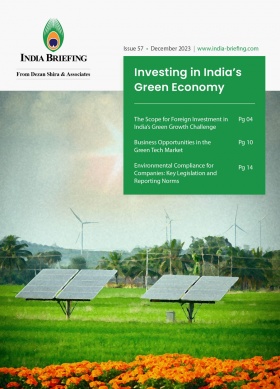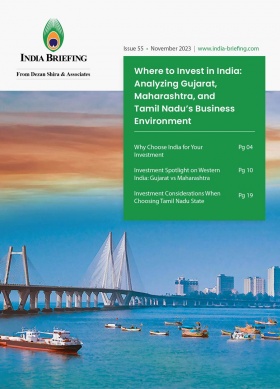How Tamil Nadu’s Footwear Industry is Competing with Southeast Asian Markets
The footwear industry in the South Indian state of Tamil Nadu is getting ready to compete with SEA markets and neighbors like Bangladesh. Since announcing its Footwear and Leather Products Policy in 2022, the state has attracted several manufacturing investment proposals, including from OEM/ODM vendors to major market players like Adidas, Nike, and Crocs.
The global footwear industry is undergoing a significant transformation as major manufacturers seek to relocate or add to their operations in China and explore new bases. Various emerging Asian markets are actively competing to meet this demand.
For a long time, China held a dominant position in the industry, with a majority of footwear companies sourcing their products from the nation. However, recent developments, including rising input and labor costs, pandemic disruptions exacerbated by a stringent zero-COVID policy, and escalating trade tensions between the US and China, have prompted manufacturers to reconsider their reliance on China.
As supply chains shift, India seeks to capitalize on the dynamic situation by enticing manufacturers to invest in the country through a combination of investment incentives and tax breaks. Nevertheless, it encounters formidable competition from Southeast Asian nations. As a notable example, Adidas has successfully shifted over 40 percent of its production from China to Vietnam, as part of a broader effort to diversify its supply chain.

In this article, we explore how the southern state of Tamil Nadu could emerge as a strong Indian base in the global footwear industry supply chain.
Performance of Southeast Asian markets in the global footwear industry
The global footwear industry currently stands at US$390.10 billion and is expected to reach US$503.83 billion by 2028, at an anticipated compound annual growth rate (CAGR) of 5.25 percent (2023-2028).
Benefiting from the reordering global supply chain, Vietnam is experiencing exponential growth in its footwear industry, propelling it to the position of the second-largest global exporter. The nation has become the primary hub for footwear production for major brands such as Nike, Adidas, Puma, owing to its stability, attractive investment climate, and a sizable pool of affordable labor besides its network of free trade agreements.

In addition, Indonesia has benefitted from a steady growth in its exports since 2013, establishing itself as the world’s third-largest footwear exporter. Footwear companies are showing increasing interest in the nation; for instance, sportswear major New Balance opened its seventh factory in Java in 2023 and currently employs over 40,000 people. Indonesia is now the fourth-biggest footwear maker in the world after China, India, and Vietnam. The nation’s attractiveness is enhanced by natural resources like rubber and the availability of low-cost manpower.
India’s position in the global footwear supply chain
India is experiencing growth in exports, though it still trails behind some of its Asian counterparts, including neighboring Bangladesh. However, this could change in the next two to three years as vendors to prominent global manufacturers turn their attention to India.
In late November 2023, the Tamil Nadu state government inaugurated a new footwear manufacturing facility set up by JR One Footwear Pvt Ltd, at an investment of INR 4 billion (US$48.12 million), and located in Eraiyur, Perambalur district, about 250 km south of capital Chennai. JR One Footwear, which is a joint venture (JV) between Phoenix Kothari Footwear and Shoetown Footwear (Nike’s largest contract manufacturer), started manufacturing the popular clogs brand Crocs at the factory from November 28, 2023. The Crocs plant, built and operationalized within a year, is spread across 50 acres within a footwear park that has been developed by Phoenix-Kothari Footwear at the Perambulur SIPCOT Industrial Park. The JV undertaking is promoted by both Kothari Industrial Corporation Limited (KCIL) and Taiwan’s Evervan Group. Following this successful collaboration, additional Taiwanese manufacturers, including Feng Tay, Pou Chen, and Hong Fu, have signed agreements with the Tamil Nadu government.
Factors favoring Tamil Nadu
As India aims to establish itself as a competitive country for footwear production, Tamil Nadu seems to hold the most potential. The state, with its excellent human resources where women play a crucial role, coupled with the existing industrial base and policies promoting sectoral growth, is propelling the state to become the largest exporter. Currently, over 45 percent of the country’s exports in the footwear industry originate from Tamil Nadu alone.
The Tamil Nadu government has also introduced a Footwear and Leather Products Policy to provide favorable terms for manufacturers to relocate to the state. This policy has a vision of transforming Tamil Nadu into the most favored destination for manufacturing footwear and leather products in Asia.
The Footwear and Leather Products Policy, 2022 covers the following:
- Existing major production centers, such as Chennai, Ambur, Ranipet, Vaniyambadi, Trichy, and Dindigul, are being studied to identify manufacturing supply chain gaps that can be addressed through infrastructure development either by the government or by public-private partnership.
- Increasing the supply of skilled labor by offering quality training programs through prominent research and design institutions in the state, including the Central Leather Research Institute (CLRI), Footwear Design & Development Institute (FDDI), Central Footwear Training Institute (CFTI), and National Institute of Fashion Technology (NIFT).
- Promoting footwear exports by creating support infrastructure such as design studios and quality control facilities.
- Developing mega leather clusters with well-equipped plug-and-play facilities to attract large domestic and international investors.
- Marketing and branding support to footwear manufacturers participating in international trade fairs and conventions.
- Setting up efficient traceability systems that trace the movement of product through stages of production, processing, and distribution.
- Developing logistic infrastructure that connects greenfield and brownfield leather and footwear parks/clusters.
- Marketing assistance by hosting annual buyer-seller meet where leather and footwear manufacturers can showcase their export category products.
- Creating a single-window portal (SWP) for sector-specific and sector-agnostic clearances to make the process faceless, contactless, and paperless.
- Incentives offered to manufacturers under the Tamil Nadu Leather and Footwear Products Policy 2022.
- Subsidized land at SIPCOT (State Industries Promotion Corporation of Tamil Nadu) estates located in B category districts and turnover-based subsidy of 1.5 percent and 1.75 percent for units in B and C category districts.
|
Turnover-Based Subsidy (Percentage Annual Turnover) |
||
|
Industry category type |
“B” category district |
“C” category district |
|
Leather footwear and leather product manufacturing |
1.5% |
1.75% |
|
Standalone non-leather footwear manufacturing |
1.75% |
2% |
|
Component cluster |
1.5% |
1.75% |
Manufacturers in the state also benefit from central government initiatives, such as the Indian Footwear and Leather Development Program (IFLDP) (see link here for guidelines), which allocates US$220 million (INR17 billion) to build the infrastructure of the leather industry, enhance output, attract investments, and generate jobs. The IFLDP comprises six subsets focusing on technological progress, design, sustainability, diversification, infrastructure development, and branding assistance. On January 19, 2022, the IFLDP scheme was approved for continuation until March 31, 2026 or till further review.
Other initiatives include incorporating the footwear and leather industry in Free Trade Agreement (FTA) negotiations and a potential Production-Linked Incentive (PLI) scheme worth US$312 million (INR 26 billion) focusing on footwear, footwear raw materials, machinery, and molds.
While Southeast Asian countries possess some factors that can support more streamlined production, such as simpler labor laws, they face challenges in absorbing excess manufactured goods, as evident in Indonesia. In contrast, India, with its expanding market and a growing affluent class (people earning US$10,000 or above)—projected to reach 100 million people by 2027—can readily consume premium goods, as reported by Goldman Sachs. This equals the population of Vietnam.
The overall Indian industry is expected to produce 2,226 million pairs by 2028. This growth is primarily attributable to the increasing per capita footwear consumption, which has risen from 1.7 pairs in 2016 to 2.3 pairs in 2021. Changing market dynamics, mainly fueled by evolving shopping habits, rapid urbanization, greater brand awareness, the development of retail precincts/malls, and rising discretionary budgets, contribute to this trend.
As indicated by the World Bank’s Logistics Performance Index (LPI), India is also investing in its infrastructure to lower logistics costs. India scored a 3.4 on the LPI index compared to Vietnam’s 3.1 and Indonesia’s 3. India outperformed the two countries on key metrics, such as infrastructure, international shipments, logistics competence, tracking & tracing, and timeliness.
Similarly, the Tamil Nadu government is actively working to reduce state logistics costs by implementing several initiatives under its Logistics Policy and Integrated Logistics Plan (TNILP) 2023. The results are evident in the state’s ranking on the Logistics Ease Across Different State (LEADS) report, released by the Ministry of Commerce & Industry and the Department for Promotion of Industry and Internal Trade (DPIIT). Tamil Nadu falls under the category of Achiever state on the LEADS ranking among the three categories of Achievers, Fast Movers, and Aspirers, showcasing the strides the state is making in reducing its logistics cost.
Key takeaway: Positive investment outlook for Tamil Nadu’s footwear ecosystem
Tamil Nadu has strategically positioned itself to capitalize on the shifting supply chains away from China. With proactive measures and comprehensive policy frameworks, the state is addressing key challenges faced by manufacturers.
The state also boasts an abundance of skilled labor, offering a competitive advantage for businesses seeking to establish or expand their operations. This is evident in the state’s production capacity in other export-oriented industries—IT, electronics, automobiles, engineering goods, and textiles.
Moreover, in the footwear domain, collaboration with major international players like Shoetown and Pou Chen Group demonstrates Tamil Nadu’s commitment to fostering partnerships and leveraging global expertise.
To capitalize on the opportunities presented by Tamil Nadu’s burgeoning footwear industry, businesses are advised to:
- Explore government incentives: Evaluate and leverage government incentives, such as subsidized land and turnover-based subsidies, to reduce operational costs and enhance profitability.
- Invest in skilling: Invest in skilling initiatives to empower the local workforce and ensure productivity and efficiency in operations.
- Plan strategic partnerships: Explore strategic partnerships and collaborations with international players to access global markets and enhance competitiveness.
- Conduct market research: Do thorough market research to understand consumer preferences and emerging trends, enabling informed decision-making and targeted marketing strategies.
For further guidance and support in navigating Tamil Nadu’s footwear industry landscape and setting up a business in India, feel free to reach out to our advisory team at India@dezshira.com.
About Us
India Briefing is produced by Dezan Shira & Associates. The firm assists foreign investors throughout Asia from offices across the world, including in Delhi and Mumbai. Readers may write to india@dezshira.com for more support on doing business in India.
We also maintain offices or have alliance partners assisting foreign investors in Indonesia, Singapore, Vietnam, Philippines, Malaysia, Thailand, Bangladesh, Italy, Germany, and the United States.
- Previous Article GIFT City’s Rising Profile: Government of India Emphasizes Key Progress Ahead of Interim Budget 2024
- Next Article Ahead of Interim Budget and in an Election Year, India’s Chief Economic Advisor Releases a State of the Economy Report










